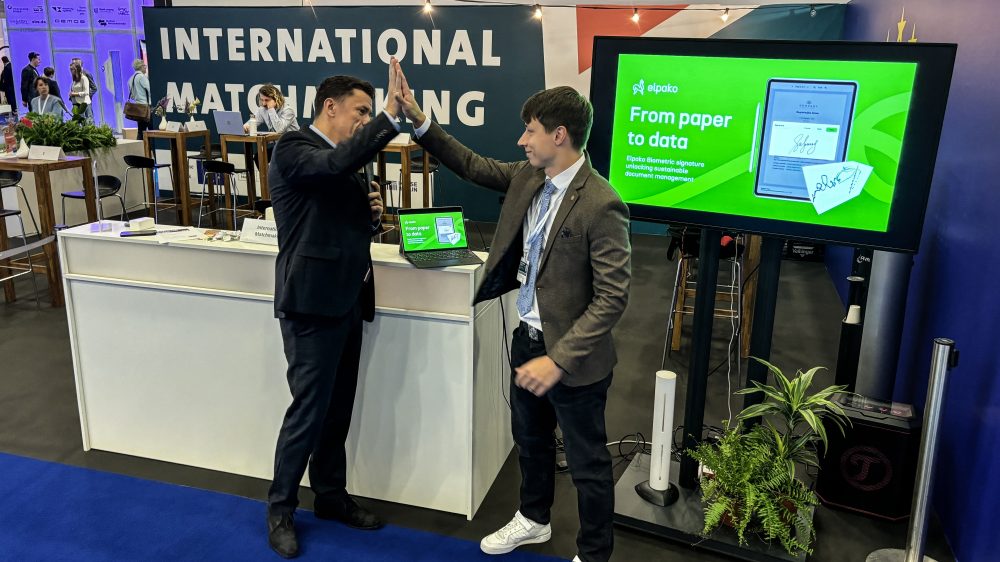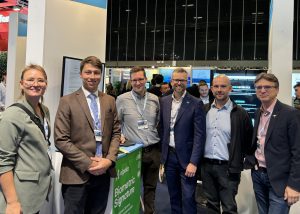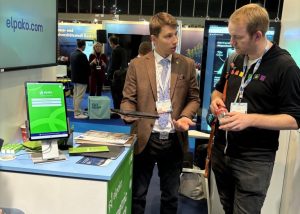
The Smart Country Convention (SCCON) 2024, held in Berlin from October 15 to 17, gathered public sector leaders, IT providers, and industry experts from across Germany to advance the future of digitalization through innovation and efficiency. Participants connected and explored the technological trends shaping digital transformation, and Elpako presented its Biometric Signature solution—a streamlined, resource-saving tool for customer service. Business Development Manager Rokas Jašinskas shared his insights into Germany’s digital landscape, highlighting both emerging opportunities and ongoing challenges, as well as Elpako’s commitment to this journey.
Germany’s IT Infrastructure Challenges
A prominent topic at SCCON was Germany’s fragmented IT landscape, shaped by its decentralized administration across states and municipalities. This division results in isolated systems, making integration complex. “The absence of a unified national ID system complicates data sharing and hinders seamless collaboration between agencies,” Jašinskas explained.
Digital Signature Demand and Need for Competition
Germany’s demand for flexible digital signature options is growing, accompanied by a call for greater competition in the sector. “Government officials emphasize the need for choice in digital signature solutions to foster innovation and efficiency,” Jašinskas noted. This view aligns with Lithuanian Deputy Health Minister Olegas Niakšu, who underscored the benefits of multiple digital signature options in Lithuania, where Elpako’s Biometric Signature on tablets is gaining traction in the public sector.

GDPR Standards and Consistency Across Europe
Germany regards GDPR as a key standard for data protection, often emphasizing its importance. However, as GDPR is an EU-wide regulation, it ensures consistent data protection across all member states. “While Germany strictly enforces GDPR, it’s essential to remember that these standards unify data protection practices across Europe,” Jašinskas pointed out, highlighting how this uniformity supports effective cross-border cooperation without added barriers.
SAP, Cloud Services, and Simplification
Germany’s ongoing reliance on SAP, known for its complexity and high costs, sparked conversations about the need for simpler and more flexible platforms, particularly in cloud services. Dominated by providers like IONOS and Schwarz Digits, the sector would benefit from accessible technologies that cater to users with diverse IT experience levels.

User-Friendly Solutions and Baltic Leadership
With Latvia as this year’s partner country, the Baltic region’s reputation as a digitalization leader was underscored, with Latvia and Lithuania recognized for delivering intuitive, user-friendly solutions. Jašinskas noted that Germany, facing a shortage of around a million IT professionals, looks to Baltic IT firms for quality, affordable solutions that support foreign innovation in its infrastructure.
Smart Cities and New Opportunities
Smart Cities took center stage, driven by increased funding for urban digitalization projects. Initiatives like the open-access “Heidi” project illustrate how the future of public services will rely on practical, seamlessly integrated solutions. These projects demonstrate that even simple, targeted digital solutions can have a significant impact on urban life.

Small Steps for Big Change
Digitalization often evokes complex solutions, yet SCCON emphasized how straightforward innovations, like digital citizen services or 5G-enabled streetlights, can transform public sector operations. As Jašinskas observed, “The Biometric Signature on tablets is just one way Elpako helps modernize the public sector. Simple, effective innovations can quickly become part of daily life and drive meaningful change.”
Bridging Awareness Gaps and Building Trust
Despite the availability of digital signature solutions, many organizations and citizens remain inclined toward traditional in-person services. “While the digital signature offers efficiency and security for the public sector, greater education and support are necessary to encourage adoption in public institutions,” said Jašinskas, underscoring Elpako’s mission to assist public institutions in effectively implementing these tools.

Sustainable Digitalization and AI Solutions
Sustainable digitalization and AI solutions, particularly for supporting non-German-speaking citizens with official documents, were also in focus. Sustainable, inclusive digitalization is a key goal for both Germany and Lithuania, promising a more accessible public sector environment.
Future Insights and Collaborative Opportunities
Jašinskas’s reflections from SCCON underscore that the future of digitalization lies in intuitive, accessible innovations that enhance public sector services and simplify integration. Solutions like the Biometric Signature on tablets not only streamline daily procedures but also support sustainable digitalization that meets the needs of both users and organizations. Elpako’s approach centers on developing systems that serve as essential, user-friendly tools, shaping a modern and efficient digital landscape accessible to all.


